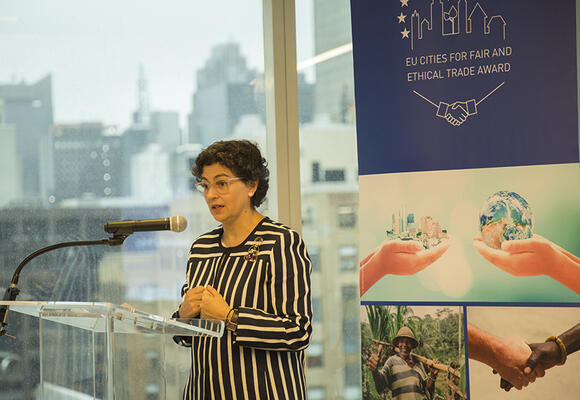
Remarks at Sustainable Trade from Regional to Global: Lessons from EU Cities for Fair and Ethical Trade (en)
New York - United States of America
Dear all,
A little over a year ago, the International Trade Centre (ITC) - the trade development agency of the United Nations and the World Trade Organisation, which is focused on SME internationalization - agreed with the European Commission that we would collaborate to raise the profile of sustainability amongst EU cities.
In June in Brussels the first EU Cities for Fair and Ethical Trade Award was held. This ceremony was a commemoration of the excellent work that European cities had been doing to showcase their innovation and commitment to sustainable actions and practices. It is never really a competition when all involved are contributing to the global good- but there was a ‘winner’ and Ghent deservedly took home this prize.
But the ultimate ‘winner’ is for the system. For not only have we decided to continue to work together to highlight sustainable practices in EU cities but the lessons learned and the ideas developed will be shared with and in partner developing countries and the best practices codified for future roll out.
Here I would like to thank Commissioner Malmström for her leadership on the Trade for All Strategy under which the EU Cities for Fair and Ethical Trade Award emanated. And thank EU Ambassador Almeida and his team for hosting us today at the Delegation during this very busy week. The importance that DG Trade places on the Award is a large part of why we are here today. Thanks as well to my colleagues from Ghent, Lyon and Madrid for making the trip from Europe.
This honour is unique as it is not merely an award. It also involves the creation of a unique network of sustainable cities as well as a Development Cooperation Project to be carried out by Ghent in collaboration with ITC.
It is appropriate that we are discussing sustainable cities during this UNGA. Cities are the new countries. What I mean here is that increasingly cities have a critical role to play in ensuring the SDGs are implemented. Cities are sources of inspiration. It is where innovative experiments can be piloted and scaled up. It is where we can risk failure before we reach success. It is where learning, technology sharing and partnership can happen with sister cities in the developing world. All of the cities that made the shortlist had one thing in common- a commitment and a belief in what I call ‘good trade’. Trade that is sustainable, inclusive, people centered and can add to the common good.
Cities must be part of the solution to achieving our shared global compass of the SDGs. This 2030 agenda is not just a nation state agenda or a UN agenda it is a city agenda as well.
This is needed more than ever in today’s world where multilateralism is at risk, and where trade is often the lightning rod of global and local problems. When multilateral cooperation and partnership is under threat, we need strong, ethical cities more than ever.
Half of all human beings live in cities. Indeed, in reflecting on the theme of this year’s General Assembly, about making the UN relevant to “all people”, we can find cohesion in cities. By incentivizing value-based trade at the municipal level, we can effectively engage with the companies and consumers that drive this change. Many answers for sustainability and responsibility can be found at the local level, starting with the citizens, the people.
Cities are influential in main three areas that are crucial for achieving the SDGs. These areas are: Solidarity and leadership; Multi-level action; and change in production and consumption habits.
Cities can lead on actions such as lauding procurement practices that can make a major difference in the livelihoods of workers along international value chains. Sourcing practices can also do much to promote environmental sustainability and women’s economic empowerment through Multi-level action cities can drive innovation by showcasing what works at the municipal level and scaling it up.
And cities have an influencing role in changing our production methods and consumption habits and in being at the forefront of helping us to achieve SDG 12, which focuses on sustainable production and consumption. After all- Production is business but consumption is citizenship; and both are interlinked.
These longer-term components aim to disseminate and scale best practices and create impact – as we are doing here this morning in New York. We are spreading the word that indeed cities have a central role to play in making core SDGs a reality.
This is why ITC is so supportive of this project and proud to partner with the European Commission in its implementation and with the city representatives here with us today. I am personally very excited about what the network which involves all the shortlisted cities, will do. This network will take the best practices that you have all implemented and mainstream them across the EU. The impact will be improved solidarity, and a focus on sustainable consumption and production.
ITC in partnership with DG Trade and Ghent will be implementing a joint project in a developing country focused on building international sustainable trade connections. This is how we will leverage what we have done for the greater good. Sharing and exchanging intelligence on how we can make cities around the world work for inclusive trade and sustainable development.
Thank you for your commitment to more fair and ethical trade. We are looking forward to continuing the momentum we started in June in Brussels and working with all of you via the City Award Network, the Development Cooperation Project and in anticipation of the 2nd edition of the Award in 2020.
Thank you.



